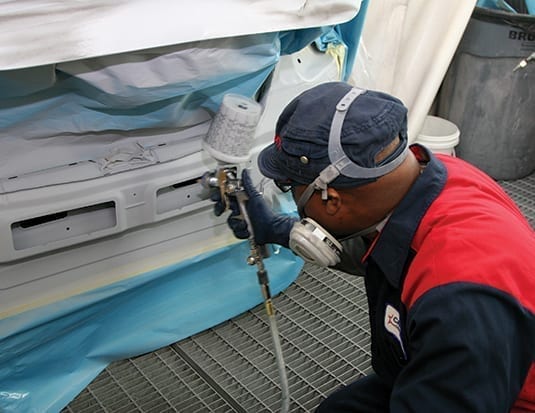Upholding the standards of training and apprenticeship programs is paramount for the collision repair industry, in the face of current changes.
The Ministry of Training, Colleges and Universities recently announced the reduction and, in some cases, elimination of annual membership fees for the Ontario College of Trades (OCOT), effective from April 12 this year.
As per this announcement, fees for Apprentice Class members, Journeyperson Candidates Class members and Tradespersons Class members have been completely eliminated. Additionally, the fee for Journeypersons Class members has been reduced to $60.
Impact on the industry
With the steady increase in fees in recent years combined with the rising expenses on all fronts within the industry, this is a positive move according to Diane Freeman, Executive Director, Automotive Aftermarket Retailers of Ontario (AARO). “It’s a huge advantage for apprentices coming into the trade as they don’t have to pay a membership fee to belong to the OCOT. It is advantageous for shop owners as well looking at the different costs associated with running a business,” adds Freeman.
However, this fee reduction will not have a significant impact on the collision repair industry, suggests John Norris, Executive Director of Collision Industry Information and Assistance (CIIA). Since the government announced the closure of OCOT, the industry is looking at a different set of challenges. “It’s not the fee. It’s the loss of curriculum and standards development as well as industry Trade Board input, and no more enforcement to ensure unlicensed incompetent folks are not repairing cars,” says Norris. He also says additional issues will be the absence of representation on national committees like Red Seal, no help for foreign credentialed technicians to work in Canada, and no one to promote apprenticeship and skills development.
OCOT has so far been performing compliance and enforcement duties. Norris believes that in its absence, fewer repair shops might sign up their apprentices. What he fears is that repair technicians may be hired at a lower pay level. Additionally, it might lead to an increase in demand for unskilled workers to work in large shops for specific work, i.e., bumper or panel replacers at $16 an hour rather than moving towards skilled, higher-paid licensed positions.
Industry-led training programs
As part of the recent announcement, the Government of Ontario has proposed Modernizing the Skilled Trades and Apprenticeship Act. If passed, a new governance model for the skilled trades and apprenticeship system will be established. “The government does not understand everything that goes into repairing different types of vehicles. We need to work together to find a way to ensure that apprenticeship training programs are up-to-date,” says Freeman.
Advisory boards representing the collision repair industry have already been advising government and OCOT and giving valuable input on improvements required for training. The current training curriculum is industry-designed, led and mandated. Norris believes that the collision repair sector will do fine for the next two to three years in terms of training standards, but it would be better to have more training hours allocated to the latest technologies within these programs.
The current models include block-release apprenticeships, fee-payer programs, night and day release models, pre-apprenticeship programs (including co-ops in shops), as well as consortium training. “As long as these programs follow the curriculum guidelines and training standards set by the industry, we can build on that,” says Norris. “We would like to audit colleges to confirm that the training is being done and follows the curriculum,” he adds. Norris says that the intake of apprentices has not been hindered by present issues such as the disbanding of the industry trade board and OCOT, funding cuts to the Ministry, and the inability of some Colleges to get these programs running. However, he does believe that retention will be a major issue. “Trades competency and skills development are threatened, until we know what the government has in mind,” he says.
*John Norris sadly and suddenly passed away after this article was written.



